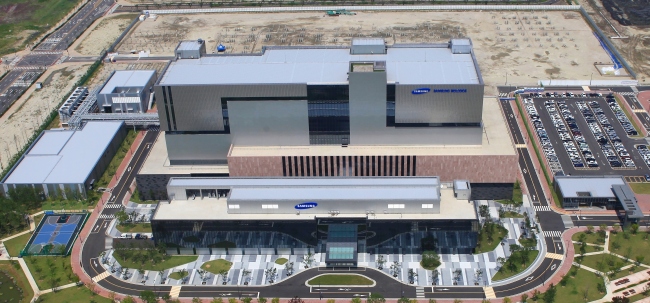Samsung merger to drive growth in biopharmaceutical business
By 손지영Published : July 20, 2015 - 18:32
Boosted by the successful merger of Samsung C&T and Cheil Industries last week, Samsung Group is geared to step up its efforts to expand and develop its biopharmaceutical business, seen by the group as a future growth engine.
The $8 billion merger has tightened the group’s grip on Samsung BioLogics, the conglomerate’s biopharmaceutical business unit. The merged firm now owns 51.2 percent of the pharmaceutical company, combining a 46.3 percent stake held by Cheil Industries with Samsung C&T’s 4.9 percent stake. Samsung Electronics also owns a 46.3 percent stake.

Samsung BioLogics is expected to take the lead in the group’s plans to target lucrative, emerging sectors that will spearhead Samsung’s efforts to fulfill its growth target -- recording an ambitious annual growth rate of 10.2 percent and 60 trillion won ($52.7 billion) in sales by 2020.
Samsung BioLogics, based in Songdo, Incheon, is a contract manufacturer for global pharmaceutical companies such as Bristol-Myers Squibb and Roche. BioLogics also owns a 90.3 percent stake in Samsung Bioepis, which specializes in producing biosimilars -- lower-priced copies of brand-name biologic drugs that have lost patent protection.
Leading the group’s aim to join the world’s top 10 pharmaceutical companies by 2020, Samsung Bioepis revealed plans last month to list on Nasdaq, in a bid to reach its target valuation of at least $8 billion and raise funds for the research and development of seven new biosimilar drugs.
Biosimilar versions of renowned rheumatoid arthritis treatment drugs such as Enbrel and Remicade are currently under review for commercialization in Europe and the United States, the company said.
The Korean pharmaceutical company also announced earlier this month that it has successfully developed its own copy of Humira, which has been shown in clinicals to have the same therapeutic effects as the original.
The firm is reportedly looking to commercialize the biosimilar drug in line with its approaching patent expiration date in the U.S. in 2016 and Europe in 2018.
Cancer therapy drugs like Herceptin and Avastin, as well as Lantus, a diabetes treatment drug, are reportedly in the final stages of clinical tests here as well.
As patents for these brand-name drugs are set to expire over the next few years, the biosimilar industry is projected to continue expansion. The original drugs are among the world’s top 10 best-selling drugs, each recording $6 billion to $13 billion in profits annually.
On top of product development, Samsung Bioepis has also sealed a deal with global pharmaceutical firm MSD for the distribution and sales of its biosimilar drugs, establishing a stable marketing channel for the company to carry out its business globally.
Meanwhile, Samsung BioLogics has invested $700 million into expanding its biologics manufacturing complex in Incheon. Upon completion in 2016, the plant’s production capacity is set to reach 150,000 liters per year, third most after Switzerland’s Lonza and Germany’s Boehringer Ingelheim.
The company also stated plans to build two more plants by 2020, driving up the complex’s production capacity to 400,000 liters.
Other recent moves by the pharmaceutical firm include joining hands with London-based biologics giant AstraZeneca to establish a joint company focused on research and development.
“Samsung expects to derive grand new opportunities from innovation that stems from the fusion of information technology and biotechnology medicine,” said Samsung vice chairman Lee Jae-yong during the 2015 Boao Forum for Asia, held in March in China.
By Sohn Ji-young (jys@heraldcorp.com)



![[AtoZ into Korean mind] Humor in Korea: Navigating the line between what's funny and not](http://res.heraldm.com/phpwas/restmb_idxmake.php?idx=644&simg=/content/image/2024/04/22/20240422050642_0.jpg&u=)
![[Exclusive] Korean military set to ban iPhones over 'security' concerns](http://res.heraldm.com/phpwas/restmb_idxmake.php?idx=644&simg=/content/image/2024/04/23/20240423050599_0.jpg&u=20240423183955)



![[Graphic News] 77% of young Koreans still financially dependent](http://res.heraldm.com/phpwas/restmb_idxmake.php?idx=644&simg=/content/image/2024/04/22/20240422050762_0.gif&u=)
![[Herald Interview] Why Toss invited hackers to penetrate its system](http://res.heraldm.com/phpwas/restmb_idxmake.php?idx=644&simg=/content/image/2024/04/22/20240422050569_0.jpg&u=20240422150649)





![[Exclusive] Korean military to ban iPhones over security issues](http://res.heraldm.com/phpwas/restmb_idxmake.php?idx=652&simg=/content/image/2024/04/23/20240423050599_0.jpg&u=20240423183955)



![[Today’s K-pop] Ateez confirms US tour details](http://res.heraldm.com/phpwas/restmb_idxmake.php?idx=642&simg=/content/image/2024/04/23/20240423050700_0.jpg&u=)